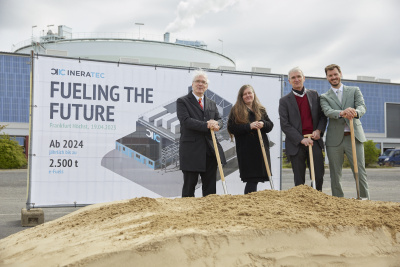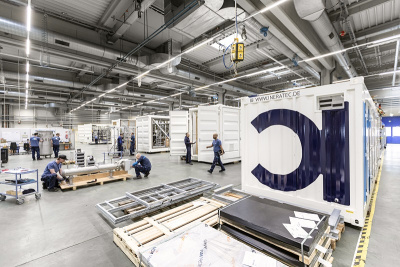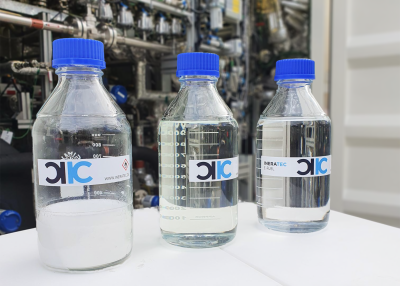Germany's largest pilot plant for synthetic kerosene in Hessen will be the first to demonstrate how the fluctuating availability of renewable energy affects the production of CO2-neutral power-to-liquid fuels.
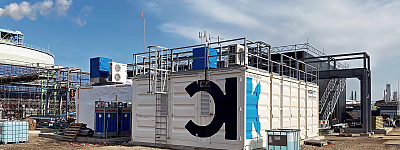
RePoSe - Real-time Power Supply for e-fuels
Together with partners from research and industry, the RePoSe (Real-time Power Supply for e-fuels) project will investigate from 2022 to 2026 how Fischer-Tropsch synthesis for the production of PtL fuels can be operated variably. Part of Ineratec GmbH's pilot plant in Industriepark Höchst will be used for this purpose.
The RePoSe project is being funded by the German Federal Ministry of Digital Affairs and Transport with around EUR 3.4 million as part of the overall Renewable Fuels Concept. The Hessian Ministry of Economics, Energy, Transport, Housing and Rural Areas (HMWVW) is contributing up to an additional EUR 1.25 million to the project. The development platform for PtL fuels is coordinated by NOW GmbH and implemented by the project sponsors VDI/VDE Innovation + Technik GmbH.
CO2-neutral fuel from water, electricity and CO2
In the PtL process, water is split into hydrogen and oxygen with the aid of electricity, and the hydrogen produced in this way is used together with CO2 from industrial processes to synthesize hydrocarbons. If the electricity used for this comes from Renewable energies, the CO2 cycle can be completely closed. This means that when such PtL fuels are burned, only as much CO2 is released as was captured during production. In addition, fewer air pollutants are produced than with conventional fuels. The end product is CO2-neutral Kerosene, for example.

Overview and outlook regarding technologies for power-to-liquid production 2025
Analysis of the power-to-liquid production process, alternative approaches and capacities to cover German kerosene demand for 2025
24.09.2025 download (PDF 1,42 MIB )
Continuous demand meets variable power production
Fischer-Tropsch synthesis is a large-scale process for converting synthesis gas (CO/H2) into liquid hydrocarbons. So far, this technology has only been investigated in continuous operation with a continuous hydrogen supply. A key question for subsequent industrial upscaling is how fluctuations in the power supply from Renewable energies can be buffered during the production of the synthetic Kerosene.
Since electricity from the sun and wind is not continuously available, hydrogen storage facilities are needed as buffers. How large these need to be is being calculated and tested in practice in the RePoSe project. Another particularly interesting aspect is the options for increasing flexibility in the production process. In addition to the technical testing of the operation, the effects of variable operation on the sustainability of fuel production (including a life cycle analysis) and on the mechanical stress on the Fischer-Tropsch plant will also be determined.
Moving things forward for power-to-liquid kerosene
On 16.11.2022 Oliver Luksic, Parliamentary State Secretary at the Federal Ministry for Digital and Transport (BMDV), handed over the funding certificate to the RePoSe project team.
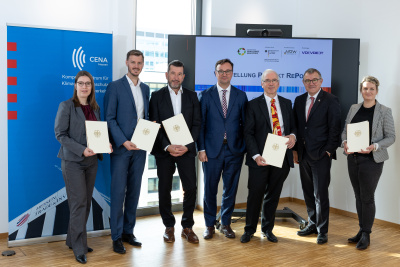
Handover of the funding decision for the RePoSe project. In the photo (from left to right): Dr. Andrea Gassmann (Fraunhofer IWKS), Dr. Tim Böltken (Ineratec), Dr. Ralf Ehret (Provadis University), Oliver Luksic (PStS BMDV), Dr. Alexander Zschocke (CENA), Dr. Rainer Waldschmidt (HTAI) and Dr. Christiane Bucher (Fraunhofer LBF).
Project progress - Groundbreaking ceremony for the production plant
On April 19, 2023, Hessen's Economics Minister Tarek Al-Wazir officially broke ground for Ineratec's production plant. Germany's first large-scale power-to-liquid plant is now being built at Industriepark Höchst in Frankfurt. Starting in 2024, it will produce up to 2,500 tons of sustainable e-fuels, especially sustainable aviation fuels, annually. The individual modules will be manufactured at the company's site in Karlsruhe and then gradually integrated into the Frankfurt plant.
Al-Wazir emphasizes the importance of the project for sustainable mobility in the state: "With the largest pilot plant for synthetic kerosene in Germany, Hesse will be a pioneer in climate protection in aviation. The aim of the pilot plant is to produce synthetic kerosene on a much larger scale than before in order to gain experience for mass production. In the short term, Blending can save CO2 emissions, and in the long term it will make it possible to make flying CO2-neutral. However, one thing is clear: In general, the economical and efficient use of energy must come first, and e-fuels will remain a rare commodity for some time to come. They must be used specifically where direct electrification is not possible, especially in the air or at sea."
Project partners
The partners in the RePoSe project are CENA Hessen, Fraunhofer IWKS, Fraunhofer LBF, Ineratec GmbH and Provadis School of International Management & Technology AG.
CENA Hessen is the project coordinator for RePoSe and is investigating the optimization of synthesis plant downtime and hydrogen storage sizing in this project. This includes obtaining and analyzing data on power availability from renewable generation, performing the optimization calculations, and the practical operation of a hydrogen storage facility.
As part of the project, Fraunhofer IWKS will investigate the system components replaced at specified intervals and their wear as well as any fatigue phenomena that may occur (cracking, surface damage) metallographically, structurally, microstructurally, and morphologically. This gives the opportunity to carry out targeted optimizations on the materials used and to investigate the effects from operation in combination with the effects of hydrogen.
Fraunhofer LBF is investigating the reliability of the system under variable loads. This includes the measurement and evaluation of local stresses on the plant, the derivation of fault-effect relationships for the evaluation of failure scenarios and their effects on the operating time as well as on plant efficiency and safety. Cyclic analyses of the polymeric and metallic materials used will be used to evaluate material degradation caused by the plant's contact media.
Ineratec GmbH plans to build a pioneering power-to-liquid (PtL) plant for generating e-fuels at Industriepark Höchst. It will produce up to 2,500 tons or 4.6 million liters of INERATEC e-fuels annually from up to 8,000 tons of biogenic CO2 and renewable electricity. The pioneer plant is made up of individual, standardized modules. One of these modules is to be incorporated into the RePoSe project in order to test a volatile power supply.
Provadis School of International Management & Technology AG will perform a life cycle analysis as part of the RePoSe research project. This will quantify the environmental impacts, such as the CO2 footprint and the use of resources, in detail and in relation to each process step. This makes it possible to identify at an early stage which process steps have a high environmental impact so that measures can be taken to reduce them. In addition, it can be deduced whether there are ecological advantages compared to continuous processes.
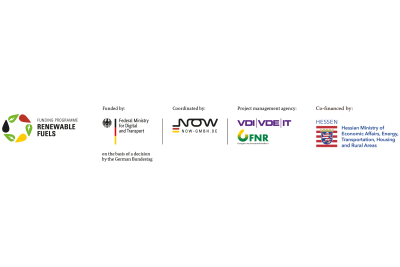

Dr. Alexander Zschocke
Senior Manager Power-to-Liquid
Department
Centre of Competence for Climate, Environment and Noise Protection in Aviation (CENA Hessen)

Felicitas Koch
Project Manager Sustainable Aviation Fuels
Department
Centre of Competence for Climate, Environment and Noise Protection in Aviation (CENA Hessen)

Dr. Lahbib Zealouk
Research Associate
Department
Centre of Competence for Climate, Environment and Noise Protection in Aviation (CENA Hessen)

